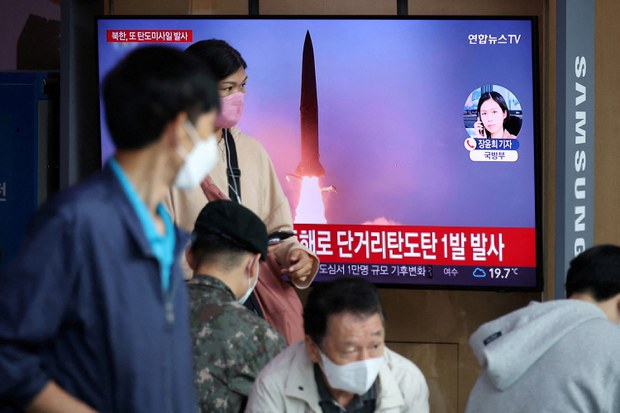North Korea missile tests fail to impress its struggling citizens
Share

People watch a TV broadcasting a news report on North Korea firing a ballistic missile towards the sea off its east coast, in Seoul, South Korea, September 25, 2022.
North Korea’s recent spate of missile launches has failed to impress its hard-pressed citizens, many of whom are privately grumbling about the misallocation of money they’d rather see spent relieving their poverty, sources in the country told RFA.
North Korea fired a missile on Sunday, two on Wednesday and two more on Thursday, marking five launches in five days and 36 for the year, according to the Korea Herald, a South Korean newspaper. The Wednesday and Thursday launches bookended a visit by U.S. Vice President Kamala Harris to South Korea, during which she visited the demilitarized zone that separates North from South.
“Regarding the missile launch on the 25th, most residents are critical of the authorities, saying they don’t understand why they keep launching missiles as they do nothing to help the people’s livelihood, and only make it more difficult for our economy,” a resident of the northeastern province of North Hamgyong told RFA’s Korean Service Wednesday on condition of anonymity for security reasons.
“News of the missile launch has not yet been delivered through the media, but they are happening so frequently that people gave up their interest in the topic long ago. Most of us are desperately struggling to make ends meet right now,” he said.
The North Korean economy is in shambles due to restrictions put in place in response to the coronavirus pandemic and international sanctions meant to deprive Pyongyang of cash and resources that could be funneled into its nuclear and missile programs.
The sanctions are intended to dissuade Pyongyang from pursuing its nuclear agenda, but North Korean leaders claim they make the missile launches necessary, the source said.
“The authorities say that the current economic situation … is difficult because of sanctions and pressure from the United States and the international community, and strengthening national defense capabilities by making nuclear weapons and missiles can put a stop to the sanctions and pressure from the United States,” he said. “And some people believe such propaganda, … although it’s only a small number who are showing a positive attitude towards the missile launches.”
Each missile launch is costly. According to a June report by the Seoul-based Korea Institute for Defense Analyses, North Korea at that time had spent between U.S. $400 million and $650 million on 33 missile launches, or about 2 percent of its gross domestic product. The average cost per launch is therefore between $12 million and $20 million, or about 3-5 million times the average North Korean monthly salary.
“When I told some people who were complaining about the missile launch about the approximate cost of making one missile, they were surprised,” the source said, without clarifying how much he estimated the cost to be.
“They expressed their anger, saying if they don’t spend so much money to make missiles, but rather use the money to help the lives of the people, we wouldn’t have to go through this difficulty,” the source said.
Most people oppose the missile launches and think the government’s first priority is to help them, although a fear of being punished keeps them from saying so publicly, a resident of the northwestern province of North Pyongan told RFA on condition of anonymity to speak freely.
“The Central Committee [of the Korean Workers’ Party] has been making it difficult for the people these days, saying that nationalism, obedience and loyalty to the supreme leader are the true path of patriotism,” the second source said, referring to Kim Jong Un.
“Now more than ever, residents are reluctant to discuss politically sensitive issues, including missile launches, for fear of being caught wrongly speaking or acting at a time like this,” he said. “It is not like they agree with the Central Committee’s propaganda, that the economy will get better if we make more nuclear weapons and missiles. … It seems to be their survival strategy to avoid causing trouble.”
Translated by Leejin J. Chung. Written in English by Eugene Whong.







